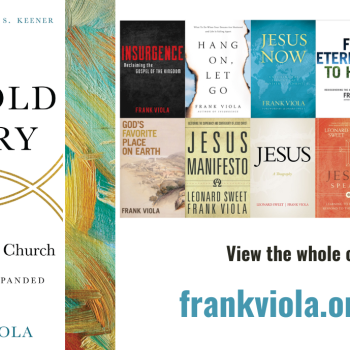 A column with this heroic title must begin with a caveat: we don't know for sure why God made us, and in this life we probably cannot. But when I read Timothy Dalrymple's beautiful and poignant piece from January 26, "Why We Have Children," and encountered the line "We have children because love overflows," my mind went immediately to a thought that began running through it some years ago.
A column with this heroic title must begin with a caveat: we don't know for sure why God made us, and in this life we probably cannot. But when I read Timothy Dalrymple's beautiful and poignant piece from January 26, "Why We Have Children," and encountered the line "We have children because love overflows," my mind went immediately to a thought that began running through it some years ago.
The thought is an answer to the questions "Why did God make us? Why did He launch the project of humanity? What was the purpose?" And so far, I have not been able to improve on this answer: "To multiply love in the universe."
God describes himself with a number of adjectives. He clarifies himself through different metaphors, from the majestic to the homely. He calls Himself I AM. In giving the Law to the Israelites, He establishes His authority: "I am the Lord your God." In the New Testament, through the grace of Jesus Christ, He becomes our Abba Father, like the Daddy of childhood. But of all the things known to man and understood by him, what does God say He is? "God is love" (1 Jn. 4:8; all citations NIV).
Just as we have children because love overflows, we can posit that God gave us the whole panoply of human life and history for the same reason. He is love; we model love, reflect love, expand love outward in infinite sequence. Made in his image, we were made to understand love and to receive and give it. All of our abilities, joys, and sorrows are intertwined with it.
In Philippians 1:9-10, for example, we read Paul's prayer for the Philippians: "that your love may abound more and more in knowledge and depth of insight, so that you may be able to discern what is best and may be pure and blameless for the day of Christ . . ." We are not in the habit of thinking of love as a key to knowledge and insight, but that's how God presents it. He is very particular about His definition of love, giving us an extensive one in 1 Corinthians 13:
Love is patient, love is kind. It does not envy, it does not boast, it is not proud. It does not dishonor others, it is not self-seeking, it is not easily angered, it keeps no record of wrongs. Love does not delight in evil but rejoices with the truth. It always protects, always trusts, always hopes, always perseveres. Love never fails.
Without love, we make only the noise of clanging cymbals. All our prophecies, knowledge, compassionate giving, and self-denial are nothing without love. To gain an understanding of love is to be a grown-up: to put away childish things and stand face to face with the crystalline truth of God.
There are faith, hope, and love, Paul says, these three. But the greatest of them is love. In scriptural terms, that's a big claim. Faith and hope are pretty great themselves. Throughout the Bible, the concept of hope is associated closely with Jesus: the promise of him, his coming, and his gift of salvation. Paul dedicates much of Romans 4-5 to discussing the significance of Abraham's hope and faith, as an introduction to the meaning of Jesus.
Faith, for its part, can move mountains (Mt. 17:20). Indispensable to life, faith is "confidence in what we hope for and assurance about what we do not see" (Heb. 11:1). The righteous live by it (Hab. 2:4); we walk by it (2 Cor. 5:7). The author of Hebrews devotes his entire eleventh chapter—often call the "Faith Hall of Fame"—to listing what the ancients achieved by faith and were commended for, from Abel in Genesis 4 to David, Samuel, and the prophets, whose stories are examples for us in every aspect of life.
Yet, great as faith and hope are, love is greater. Faith and hope are tools, mindsets, agents of purpose and reward. Love is a reason. "For God so loved the world that he gave his one and only Son, that whoever believes in him shall not perish but have eternal life" (Jn. 3:16). Love is the greatest principle we know. It just may be the reason for everything.
Interestingly, I wasn't planning to write on this kind of topic for my Monday column. The events in the Middle East seemed like a natural fit for me, since I write often about politics, society, and the military. But I had a strong sense, when I sat down to write, that this is what I am supposed to say right now.
When we are in the middle of tremendous political events, we should be reminded of this fact: God's great project is not to reorder the world around us, it is to transform the heart of each of us. For the former, reason and authority would be enough. It's the latter that requires the principle of love.
2/7/2011 5:00:00 AM





